- Home
- J. D. Robb
Rapture in Death Page 11
Rapture in Death Read online
Page 11
“I haven’t got much yet,” Peabody began as she followed Eve out of the interview room. “There wasn’t time.”
“There’s time now. And Feeney’s probably come through. Get me what you’ve got, then get me more,” Eve demanded and swung into her office. “Engage,” she ordered the computer as she plopped down in front of it. “Play new communications.”
Roarke’s face swam onto the screen. “I assume you’re out fighting crime. I’m on my way to London, a little glitch that requires personal attention. I don’t imagine it will take long. I should be back by eight, which will give us plenty of time to fly out to New Los Angeles for the premiere.”
“Shit, I forgot.”
On screen, his image smiled. “I’m sure you’ve conveniently forgotten the engagement, so consider this a gentle reminder. Take care of yourself, Lieutenant.”
Flying to California to spend the evening rubbing elbows with puffed-up video types, eating the glossy little vegetables people out there considered food, tolerating reporters sticking recorders in her face and asking lame questions was not her idea of an entertaining evening.
The second communication was from Commander Whitney, ordering her to prepare a statement for the media on several ongoing cases. Hot damn, she thought sourly. More headlines.
Then the data from Feeney flashed on screen. Eve rolled her shoulders, hunkered down, and got to work.
At two, she walked into the Village Bistro. Her shirt was sticking to her back as the temperature control on her unit had once again died an unnatural death. The air inside the tony restaurant was ocean breeze cool. Soft, loving zephyrs flitted through, teasing the feathery palms, which grew in huge, white china pots. Glass tables were arranged on two levels, cleverly situated near a small, black water lagoon or in front of a wide-view screen of a white sand beach. Servers wore short uniforms in tropical hues and threaded their way through the tables with offerings of colorful drinks and artistically arranged dishes.
The maître d’ was a droid dressed in a flowing white jumpsuit and programmed with a snooty French accent. He took one look at Eve’s worn jeans and limp shirt and wrinkled his prominent nose.
“Madam, I am afraid we have no tables available. You would perhaps prefer the delicatessen on the next block north.”
“Yeah, I would.” Because his attitude annoyed her, she stuck her badge in his face. “But I’m eating here. I don’t give a shit if that puts your chips in a twist, pal. Where’s Dr. Mira’s table?”
“Put that away,” he hissed, looking everywhere at once and fluttering his hands. “Do you wish my customers to lose their appetites?”
“They’ll really lose them if I take my weapon out, which is what I’ll do if you don’t show me Dr. Mira’s table and see that I’ve got a glass of iced fizzy water in the next twenty seconds. Got that program?”
His lips clamped together and he nodded. Stiff-backed, he led the way up a swing of faux stone steps to the second level, and then onto an alcove fashioned to resemble an ocean terrace.
“Eve.” Mira rose immediately from her pretty table and took both of Eve’s hands. “You look wonderful.” To Eve’s faint surprise, Mira kissed her cheek. “Rested. Happy.”
“I guess I am.” After a brief hesitation, Eve leaned forward and touched her lips to Mira’s cheek in turn.
The droid had already snapped to a server. “Dr. Mira’s companion wishes a fizzy water.”
“Iced,” Eve added, curling her lip at the maître d’.
“Thank you, Armand.” Mira’s soft blue eyes twinkled. “We’ll order shortly.”
Eve took another quick scan of the restaurant, the diners in their summer pastels and pricey cottons. She shifted on her padded chair. “We could have met in your office.”
“I wanted to take you to lunch. This is one of my favorite spots.”
“The droid’s an asshole.”
“Well, perhaps Armand is a bit overprogrammed, but the food is wonderful. You should try the Clams Maurice. You won’t regret it.” She settled back when Eve’s water was served. “Tell me, how was your honeymoon?”
Eve gulped down half the water and felt human again. “Tell me how long I can expect people to ask me that question?”
Mira laughed. She was a pretty woman with soft sable hair swept back from a quietly attractive face. She wore one of her habitually elegant suits, this one in pale yellow. She appeared polished and tidy. She was one of the leading behavioral psychiatrists in the country, and was often consulted by the police about the most vicious crimes.
Though Eve was unaware of it, Mira’s feelings toward her were strong and deeply maternal.
“It embarrasses you.”
“Well, you know. Honeymoon. Sex. Personal.” Eve rolled her eyes. “Stupid. I guess I’m just not used it. To being married. To Roarke. To the whole business.”
“You love each other and make each other happy. There’s no need to get used to it, only to enjoy it. You’re sleeping well?”
“Mostly.” And because Mira knew her deepest and darkest secrets, Eve dropped her guard. “I still have nightmares, but not as often. The memories come and go. None of it’s as bad now that I’ve dealt with it.”
“Have you dealt with it?”
“My father raped me, abused me, beat me,” Eve said flatly. “I killed him. I was eight years old. I survived. Whoever I was before I was found in that alley doesn’t matter now. I’m Eve Dallas. I’m a good cop. I’ve made myself.”
“Good.” There would be more, Mira thought. Traumas such as the one Eve had lived through cast echoes that never completely faded. “You still put the cop first.”
“I am a cop first.”
“Yes.” Mira smiled a little. “I suppose you always will be. Why don’t we order, then you can tell me why you called.”
chapter eight
Eve chose Mira’s recommendation of clams, then treated herself to some of the real yeast bread set in a silver basket on the table. As she ate, she gave Mira a profile of Fitzhugh and the details of his death.
“You’d like me to tell you if he was capable of taking his own life. Disposed to it, emotionally, psychologically.”
Eve cocked a brow. “That’s the plan.”
“Unfortunately, I can’t do that. I can tell you that everyone is capable of it, given the right circumstances and emotional state.”
“I don’t believe that,” Eve said so firmly, so decisively, that Mira smiled.
“You’re a strong woman, Eve. Now. You’ve made yourself strong, rational, tough-minded. You’re a survivor. But you remember despair. Helplessness. Hopelessness.”
Eve did; too well, too clearly. She shifted in her chair. “Fitzhugh wasn’t a helpless man.”
“The surface can hide a great deal of turmoil.” Dr. Mira held up a hand before Eve could interrupt again. “But I agree with you. Given your profile of him, his background, his lifestyle, I wouldn’t tag him as a likely candidate for suicide—certainly not one of such an abrupt and impulsive nature.”
“It was abrupt,” Eve agreed. “I dealt with him in court right before this happened. He was as smug and arrogant and full of his own sense of importance as ever.”
“I’m sure that’s true. I can only say that some of us—many of us—confronted with some crisis, some personal upheaval of the heart or mind, choose to end it rather than live through it or change it. You and I can’t know what Fitzhugh might have found himself confronted with on the night of his death.”
“That isn’t a hell of a lot of help,” Eve muttered. “Okay, let me give you two more.” Briskly, with a cop’s dispassion, she related the other suicides. “Pattern?”
“What did they have in common?” Mira tossed back. “The lawyer, the politician, and the tech.”
“A blip in the brain. Maybe.” Tapping her fingers on the cloth, Eve frowned. “I’ve got some chains to pull to get all the data, but it could be the motive. The reason behind it all might be physiological rather than psycholog
ical. If there’s a connection, I’ve got to find it.”
“You’re veering out of my field, but if you find data linking the three cases, I’d be happy to do a workup.”
Eve smiled. “I was counting on it. I don’t have a lot of time. The Fitzhugh case can’t stay a priority for much longer. If I can’t nail something down soon and use it to convince the commander to keep the file open, I’ll have to move on. But for now—”
“Eve?” Reeanna slipped up to the table, looking stunning in an ankle-skimming robe of bleeding rainbow colors. “Well, how nice. I was lunching with an associate and thought I recognized you.”
“Reeanna.” Eve worked up a smile. She didn’t mind looking like a street hawker next to the glamorous redhead, but she did mind having her consult lunch interrupted. “Dr. Mira, Reeanna Ott.”
“Dr. Ott.” Gracious, Mira offered a hand. “I’ve heard of your work and admired it.”
“Thank you, and I’ll say the same. It’s an honor to meet one of the top psychiatrists in the country. I’ve scanned a number of your papers and found them fascinating.”
“You flatter me. Won’t you sit down, join us for some dessert?”
“I’d love to.” Reeanna flicked a questioning glance at Eve. “If I’m not interrupting official business.”
“We seem to be finished with that part of the program.” Eve looked up at the waiter summoned by a discreet flick of Mira’s finger. “Just coffee. House brand. Black.”
“I’ll have the same,” Mira said. “And a dish of the Blueberry Trifle. I’m weak.”
“So am I.” Reeanna beamed at the waiter as though he would personally prepare her selection. “A double latte, and a slice of Chocolate Sin. I’m so tired of processed food,” she confided to Mira. “I intend to gorge myself while I’m in New York.”
“And how long will you be in town?”
“It depends a great deal on Roarke”—she smiled at Eve—“and how long he finds it useful to have me here. I have a feeling he’ll be shipping both William and me off to Olympus within a few weeks.”
“The Olympus Resort’s quite an undertaking,” Mira commented. “All the blips I’ve seen on the news and entertainment channels have been fascinating.”
“He’d like to have it up and fully operational by next spring.” Reeanna ran her hand up and down the trio of gold links she wore around her neck. “We’ll see. Roarke usually gets what he wants. Wouldn’t you agree, Eve?”
“He didn’t get where he is by taking no for an answer.”
“No, indeed. You were just on the resort. Did he give you a tour of the Autotronics Arcade?”
“Briefly.” Eve’s lips quirked a little. “We had . . . a lot of ground to cover in a short time.”
Reeanna’s smile was slow and sly. “I imagine you did. But I hope you tried a few of the programs that are in place. William’s so proud of those games. And you did mention you’d seen the hologram room in the Presidential Suite of the hotel.”
“I did. Made use of it several times. Very impressive.”
“Most of that’s William’s doing—the design—but I will take partial credit. We plan to utilize that new system to enhance the treatment of addicts and certain psychoses.” She shifted as their coffee and dessert was served. “That might be of interest to you, Dr. Mira.”
“It certainly would. It sounds fascinating.”
“It is. Wickedly expensive right now, but we hope to refine and bring the cost down. But for Olympus, Roarke wanted the best—and he’s getting it. Such as the Lisa droid.”
“Yeah.” Eve remembered the stunning female droid with the sultry voice. “I’ve seen her.”
“She’ll be in PR and customer service. A very superior model that took months to perfect. Her intelligence chips are unmatched by anything on the market. She’ll have decision making and personality capabilities well beyond the current available units. William and I—” She broke off, chuckled at herself. “Listen to me. I just can’t get away from work.”
“It’s fascinating.” Mira dipped delicately into her trifle. “Your study of brain patterns and their genetic thrust on personality, and their application to electronics is compelling, even to a dug-in-at-the-roots psychiatrist such as myself.” She hesitated, glanced at Eve. “As a matter of fact, your expertise might lend a new angle on a particular case Eve and I were discussing.”
“Oh?” Reeanna forked up some chocolate and all but hummed over it.
“Hypothetical.” Mira spread her hands, well aware of the official ban of layman consults.
“Naturally.”
Eve drummed her fingers on the table again. She preferred Mira’s take, but weighing the options, decided to expand.
“Apparent self-termination. No known motive, no known predisposition, no chemical inducement, no family history. Behavioral patterns up to point of termination normal. No substantiated signs of depression or personality fluctuations. Subject is a sixty-two-year-old male, professional, high-end education, successful, financially solvent, bisexual, with long-term same-sex marriage.”
“Physical disabilities?”
“None. Clean health card.”
Reeanna’s eyes narrowed in concentration, either over the profile or the dessert she was slowly spooning into her mouth. “Any psychological defects, treatment?”
“No.”
“Interesting. I’d love to see the brain wave pattern. Available?”
“Currently classified.”
“Hmm.” Reeanna sipped her latte contemplatively. “Without any known physical or psychiatric abnormalities, no chemical addictions or usage, I’d lean toward a brain blip. Possible tumor. Yet I assume none showed up in autopsy?”
Eve thought of the pinprick, but shook her head. “Not a tumor, no.”
“There are cases of predisposition that slide through genetic scanning and evaluation. The brain is a complicated organ and still baffles even the most elaborate technology. If I could see his family history . . . Well, to take a wild guess, I’d say your man had a genetic time bomb that went undetected through normal analysis. He’d reached the point in his life where the fuse ran short.”
Eve cocked a brow. “So he just blew?”
“In a manner of speaking.” Reeanna leaned forward. “We’re all coded in, Eve, in the womb. What we are, who we are. Not just the color of our eyes, our build, our skin tones, but our personalities, our tastes, our intellect, and our emotional scale. The genetic code is stamped on us at the moment of conception. It can be altered to a certain extent, but the basis of what we are remains. Nothing can change it.”
“We are what we’re born?” Eve thought of a filthy room, a blinking red light, and a young girl curled into a corner with a bloody knife.
“Precisely.” Reeanna’s smile beamed out.
“You don’t take into account environment, free will, the basic human drive to better oneself?” Mira objected. “To consider us merely physical creatures without heart, soul, and a range of choices to be made over a lifetime lowers us to the level of animals.”
“And so we are,” Reeanna said with a sweep of her fork. “I understand your viewpoint as a therapist, Dr. Mira, but mine, as a physiologist, runs down a different lane, so to speak. The decisions we make throughout our life, what we do, how we live, and what we become were printed on our brains while we swam in the womb. Your subject, Eve, was fated to take his life at that time, in that place, and in the manner he chose. Circumstances might have altered it, but the results would have been the same, eventually. It was, in essence, his destiny.”
Destiny? Eve thought. Had it been hers to be raped and abused by her own father? To become less than human, to fight her way through that abyss?
Mira shook her head slowly. “I can’t agree. A child born in poverty on the edge of Budapest, taken from the mother at birth and raised in privilege, with love and care in Paris, would reflect that upbringing, that education. The emotional nest,” she insisted, “and the basic human drive to be
tter oneself can’t be discounted.”
“I agree, to a point,” Reeanna qualified. “But the stamp of the genetic code—that which predisposes us to achievement, failure, good or evil, if you will—overrides all else. Even with the most loving and nurturing of backgrounds, monsters breed; and in the toilets of the universe, goodness, even greatness survives. We are what we are—the rest is window dressing.”
“If I subscribe to your theory,” Eve said slowly, “the subject in question was fated to take his life. No circumstances, no twists or turns of environment would have prevented it.”
“Precisely. The predisposition was there, lurking. Likely an event set it off, but it may have been a minor thing, something easily passed off in another brain pattern. Research still under way at the Bowers Institute has complied strong evidence of genetic brain patterns and their unassailable influence on behavior. I can get you discs on the subject, if you like.”
“I’ll leave the head studies to you and Dr. Mira.” Eve shoved her coffee aside. “I’ve got to get back to Cop Central. I appreciate the time, Dr. Mira,” she said as she rose. “And the theories, Reeanna.”
“I’d love to discuss them further. Any time.” Reeanna lifted a hand and shook Eve’s warmly. “Do give my best to Roarke.”
“I will.” Eve shifted slightly on her feet when Mira rose to kiss her cheek. “I’ll be in touch.”
“I hope you will, and not just when you’ve a case to discuss. Tell Mavis hello for me when you see her.”
“Sure.” Hitching her bag on her shoulder, Eve swung her way out, pausing briefly to sneer at the maître d’.
“A fascinating woman.” Reeanna slid her tongue in one long, slow lick over the back of her spoon. “Controlled, a little angry underneath, straight focused, and unused and vaguely uncomfortable with casual displays of affection.” She laughed lightly at Mira’s lifted brow. “Sorry, professional pitfall. It drives William mad. I didn’t mean any offense.”

 Concealed in Death
Concealed in Death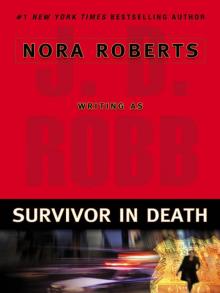 Survivor in Death
Survivor in Death Born in Death
Born in Death Ceremony in Death
Ceremony in Death Indulgence in Death
Indulgence in Death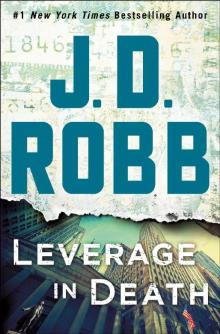 Leverage in Death
Leverage in Death Devoted in Death
Devoted in Death Conspiracy in Death
Conspiracy in Death Holiday in Death
Holiday in Death The Unquiet
The Unquiet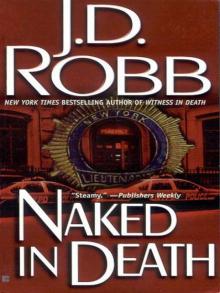 Naked in Death
Naked in Death Secrets in Death
Secrets in Death Seduction in Death
Seduction in Death Strangers in Death
Strangers in Death Creation in Death
Creation in Death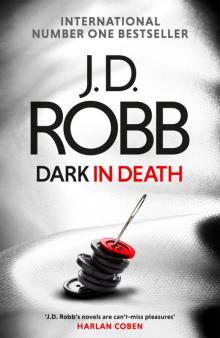 Dark in Death
Dark in Death Possession in Death
Possession in Death Visions in Death
Visions in Death Midnight in Death
Midnight in Death Innocent in Death
Innocent in Death Vengeance in Death
Vengeance in Death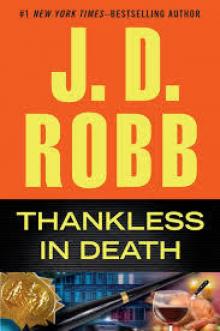 Thankless in Death
Thankless in Death Glory in Death
Glory in Death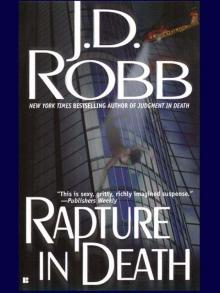 Rapture in Death
Rapture in Death Echoes in Death
Echoes in Death Betrayal in Death
Betrayal in Death Celebrity in Death
Celebrity in Death Immortal in Death
Immortal in Death Judgment in Death
Judgment in Death Ritual in Death
Ritual in Death Portrait in Death
Portrait in Death Treachery in Death
Treachery in Death Brotherhood in Death
Brotherhood in Death Reunion in Death
Reunion in Death Connections in Death: An Eve Dallas Novel
Connections in Death: An Eve Dallas Novel Imitation in Death
Imitation in Death New York to Dallas
New York to Dallas Loyalty in Death
Loyalty in Death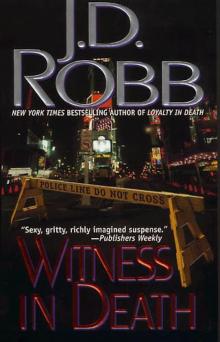 Witness in Death
Witness in Death Connections in Death
Connections in Death Divided in Death
Divided in Death Obsession in Death
Obsession in Death Purity in Death
Purity in Death Festive in Death
Festive in Death Missing in Death
Missing in Death Faithless in Death: An Eve Dallas Thriller (Book 52)
Faithless in Death: An Eve Dallas Thriller (Book 52) Golden in Death
Golden in Death The In Death Christmas Collection
The In Death Christmas Collection Forgotten in Death
Forgotten in Death Calculated in Death
Calculated in Death Salvation in Death
Salvation in Death Interlude in Death
Interlude in Death Haunted in Death
Haunted in Death Promises in Death
Promises in Death In Death 07.5 - Midnight in Death
In Death 07.5 - Midnight in Death 44 Delusion in Death
44 Delusion in Death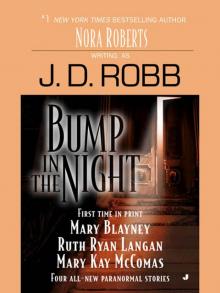 Bump in the Night
Bump in the Night The In Death Collection, Books 16-20
The In Death Collection, Books 16-20![[In Death 17] - Imitation in Death Read online](http://i1.bookreadfree.com/i/03/20/in_death_17_-_imitation_in_death_preview.jpg) [In Death 17] - Imitation in Death
[In Death 17] - Imitation in Death In Death 06 - Vengeance in Death
In Death 06 - Vengeance in Death Dead Of Night
Dead Of Night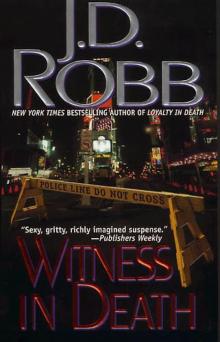 In Death 10 - Witness in Death
In Death 10 - Witness in Death![[In Death 16] - Portrait in Death Read online](http://i1.bookreadfree.com/i1/03/27/in_death_16_-_portrait_in_death_preview.jpg) [In Death 16] - Portrait in Death
[In Death 16] - Portrait in Death Possession in Death edahr-39
Possession in Death edahr-39 Remember When edahr-20
Remember When edahr-20 Big Jack
Big Jack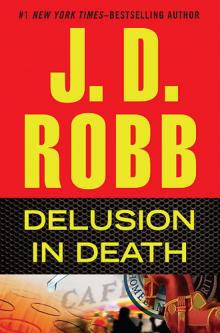 Delusion in Death edahr-44
Delusion in Death edahr-44 Missing in Death edahr-36
Missing in Death edahr-36 Origin in Death edahr-24
Origin in Death edahr-24![[In Death 18] - Divided in Death Read online](http://i1.bookreadfree.com/i1/04/03/in_death_18_-_divided_in_death_preview.jpg) [In Death 18] - Divided in Death
[In Death 18] - Divided in Death The Lost
The Lost![[In Death 05] - Ceremony in Death Read online](http://i1.bookreadfree.com/i1/04/01/in_death_05_-_ceremony_in_death_preview.jpg) [In Death 05] - Ceremony in Death
[In Death 05] - Ceremony in Death In Death 09 - Loyalty in Death
In Death 09 - Loyalty in Death Chaos in Death edahr-42
Chaos in Death edahr-42 In Death 12.5 - Interlude in Death
In Death 12.5 - Interlude in Death![In Death [47] Leverage in Death Read online](http://i1.bookreadfree.com/i1/04/01/in_death_47_leverage_in_death_preview.jpg) In Death [47] Leverage in Death
In Death [47] Leverage in Death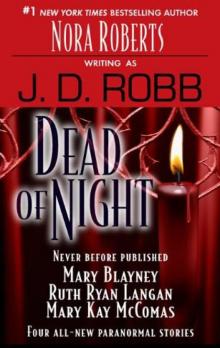 In Death - 24.50 - Dead of Night
In Death - 24.50 - Dead of Night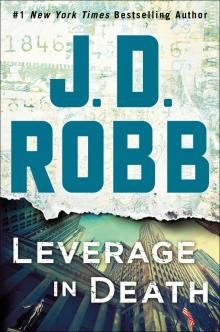 Leverage in Death--An Eve Dallas Novel
Leverage in Death--An Eve Dallas Novel![[In Death 24] - Innocent in Death Read online](http://i1.bookreadfree.com/i1/04/05/in_death_24_-_innocent_in_death_preview.jpg) [In Death 24] - Innocent in Death
[In Death 24] - Innocent in Death![[In Death 15] - Purity in Death Read online](http://i1.bookreadfree.com/i1/04/05/in_death_15_-_purity_in_death_preview.jpg) [In Death 15] - Purity in Death
[In Death 15] - Purity in Death The In Death Collection, Books 26-29
The In Death Collection, Books 26-29 New York to Dallas edahr-41
New York to Dallas edahr-41 The Other Side
The Other Side The In Death Collection 06-10
The In Death Collection 06-10![[In Death 08] - Conspiracy in Death Read online](http://i1.bookreadfree.com/i2/04/05/in_death_08_-_conspiracy_in_death_preview.jpg) [In Death 08] - Conspiracy in Death
[In Death 08] - Conspiracy in Death The In Death Collection, Books 21-25
The In Death Collection, Books 21-25 Memory in Death edahr-25
Memory in Death edahr-25 The In Death Collection, Books 30-32
The In Death Collection, Books 30-32 Down the Rabbit Hole
Down the Rabbit Hole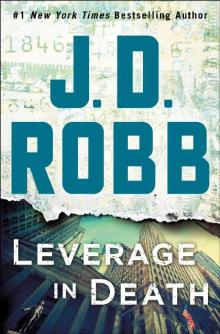 Leverage in Death: An Eve Dallas Novel (In Death, Book 47)
Leverage in Death: An Eve Dallas Novel (In Death, Book 47) The In Death Collection, Books 6-10
The In Death Collection, Books 6-10 The In Death Collection, Books 11-15
The In Death Collection, Books 11-15 Celebrity in Death edahr-43
Celebrity in Death edahr-43 Treachery in Death edahr-40
Treachery in Death edahr-40![[In Death 12] - Betrayal in Death Read online](http://i1.bookreadfree.com/i2/04/13/in_death_12_-_betrayal_in_death_preview.jpg) [In Death 12] - Betrayal in Death
[In Death 12] - Betrayal in Death The In Death Collection, Books 1-5
The In Death Collection, Books 1-5